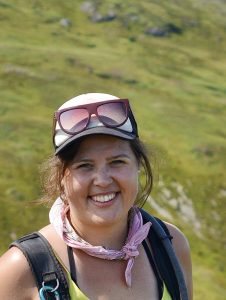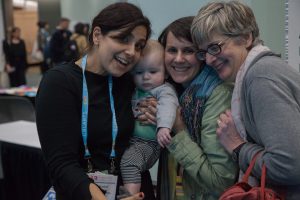CAA News Today
Meet the 2020 Student Scholarship Winners
posted by CAA — January 28, 2020
with support from

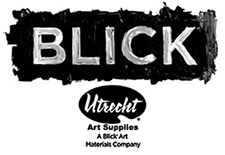
For the fourth year in a row, CAA is proud to partner with our sponsors, multinational publisher, Routledge, Taylor & Francis, and art materials specialist, Blick Art Materials, on student scholarships to assist CAA student members with conference costs.
Routledge, Taylor & Francis Student Scholarship
CAA Annual Conference Premier Sponsor, Routledge, Taylor & Francis supports four CAA student members with a $250 scholarship. The 2020 winners are:
Samara Johnson
Samara Johnson holds a BFA in Painting and Drawing, BA in French from Sonoma State University, and in May 2020 will complete her MFA in Painting and Drawing from University of Colorado at Boulder. She was born and raised in Moose Pass, Alaska. Her upbringing has inspired her to create artworks that involve use of organic materials and synthetic skins, which brings backwoods aesthetic into a contemporary setting through abstracted dimensional wall works. The artist also volunteers as a horse handler for equine assisted psychotherapy in Boulder, Colorado, which has allowed her to explore, in her work, how systems and relationships of the non-human can help humans better understand their nervous systems and emotions.
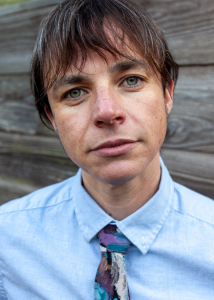
Jordan Reznick
Jordan Reznick is an artist and PhD candidate in Visual Studies at University of California Santa Cruz. Their dissertation, “Settler Modernism: Alfred Stieglitz’s The Steerage and the Vicissitudes of American Whiteness, 1890-1930″ traces how one iconic photograph came to be known as the first modernist American photograph and how, at each stage of its trajectory into the modernist canon, it was interpreted through narratives that served to modernize settler colonial myths. Reznick’s Gallery of Illustrious Queers explores transgender identity and life experiences through portrait photography. Their work has been widely exhibited in the United States, including at Aperture Gallery in New York and the Portland Museum of Art in Oregon. Reznick teaches Photography and Art History at San Francisco Art Institute and California College of the Arts. They earned an MFA in Photography and an MA in Visual & Critical Studies from California College of the Arts, and a BFA in Photography from New York University.
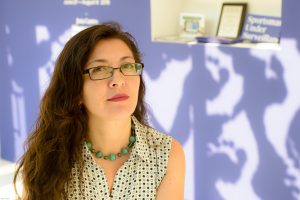
Tamara Toledo
Tamara Toledo is a PhD Art History and Visual Culture candidate at York University. Toledo is a Chilean-born Toronto-based scholar, curator and artist, graduate of OCAD University and holds an MFA from York University. Toledo is co-founder of the Allende Arts Festival and of Latin American Canadian Art Projects – LACAP. For over a decade, she has curated numerous exhibitions offering spaces and opportunities to artists of Latin American descent to showcase their work. She designed and has been curating the Latin American Speakers Series for which she has invited internationally renowned contemporary artists and curators to Toronto such as Gerardo Mosquera, Luis Camnitzer, Tania Bruguera, Alfredo Jaar, among many others to articulate and discuss issues of identity and intercultural dynamics in contemporary art. Toledo has presented her work at various conferences in Montreal, New York, Vancouver and Toronto. Her writing has appeared in ARM Journal, C Magazine, Fuse and Canadian Art. Her practice often follows an interdisciplinary approach and touches on notions of memory, identity, Latin American diasporas, transnationalism, issues of power, representation and international artistic-cultural interaction. Toledo is presently the Curator of Sur Gallery, the only space dedicated to contemporary Latin American art in Canada.
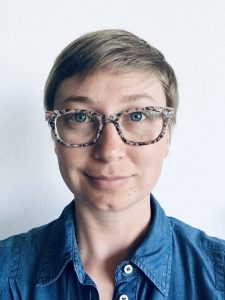
Jessica Zeglin
Jessica Zeglin uses sound, drawing, textiles, and installation to engage skills of attentiveness, listening, and care for ourselves, our human, and our other-than-human kin. Her work is field and research-based, combining perspectives from ecology, biology, fine art, craft art, and decolonial critique of these fields, with emphasis on the nuances of everyday life. She has shown work at the Weisman Art Museum, the Tamarind Institute, the University of New Mexico Art Museum, and in parks, plazas, city, and country, to audiences of many and audiences of one. Originally from rural and small-town Wisconsin, she is currently a candidate for the MFA in Art and Ecology at the University of New Mexico. You can see more of her work at www.jessicazeglin.com.
Blick Art Materials Student Scholarship
CAA Annual Conference Advocate Sponsor, Blick Art Materials supports four CAA student members with a $250 scholarship. The 2020 winners are:
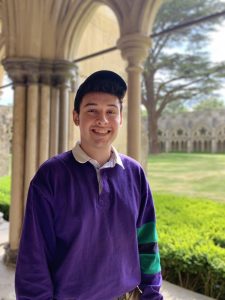
Noah Cox
Noah Cox is a third year, Art History student studying at New College of Florida. He has recently begun research for his baccalaureate thesis focusing on the art, architecture, and landscape of Bok Tower Gardens in Lake Wales, Florida. His undergraduate research in the past has focused on public art around the New College campus with a focus on student mural work. He currently works as an intern at the Sarasota Art Museum and is planning on furthering his career in the museum field.
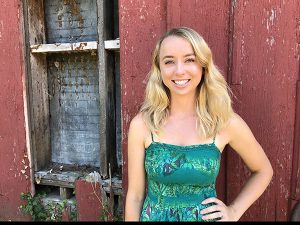
Amanda Kendrick
Amanda Kendrick is from Michigan where she received her BFA in Studio Art from Albion College in 2017. She is currently a second year Painting MFA student at Purdue University, where she teaches Foundations Drawing. Her work is rooted in familial relationships and childhood memories. She lives with her fiancé in Lafayette, Indiana.
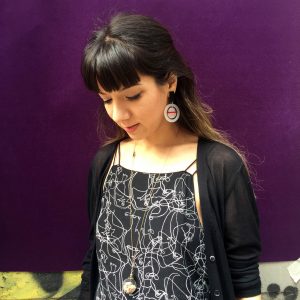
Defne Kırmızı
Defne Kırmızı is a PhD candidate Boston University in the History of Art & Architecture Department. Her dissertation focuses on the conceptual art practices and exhibition histories in Turkey between the years 1974-1994.
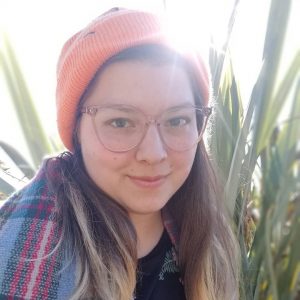
Anna Paluch
Anna (Ania) Paluch is a Polish-Canadian PhD student in Cultural Mediations at Carleton University, situated on unceded Algonquin territory in Ottawa, Canada. Her research focus is on Indigenous and Slavic Futurism, spaces of cultural hybridity, and post-memory in the diaspora, specifically around diasporic and mixed identity. She is a curator, mixed-media artist and co-director of the Indigenous+Diasporic Friendship Festival in Ottawa, connecting diasporic/immigrant communities with local Indigenous communities through art, academia and culture.
Criteria for the Scholarship
Awardees were chosen at random and fulfilled the following criteria:
- Individuals were registered for the Annual Conference by the Early Registration deadline
- Individuals are current CAA members with proof of student status
- Individuals did not receive conference registration or travel reimbursement from their institution or employer
We look forward to seeing you in Chicago next month! The 108th Annual Conference is February 12-15, 2020. Click here to explore the conference program.
Deadlines extended! Serve on a CAA Committee or Editorial Board
posted by CAA — January 27, 2020
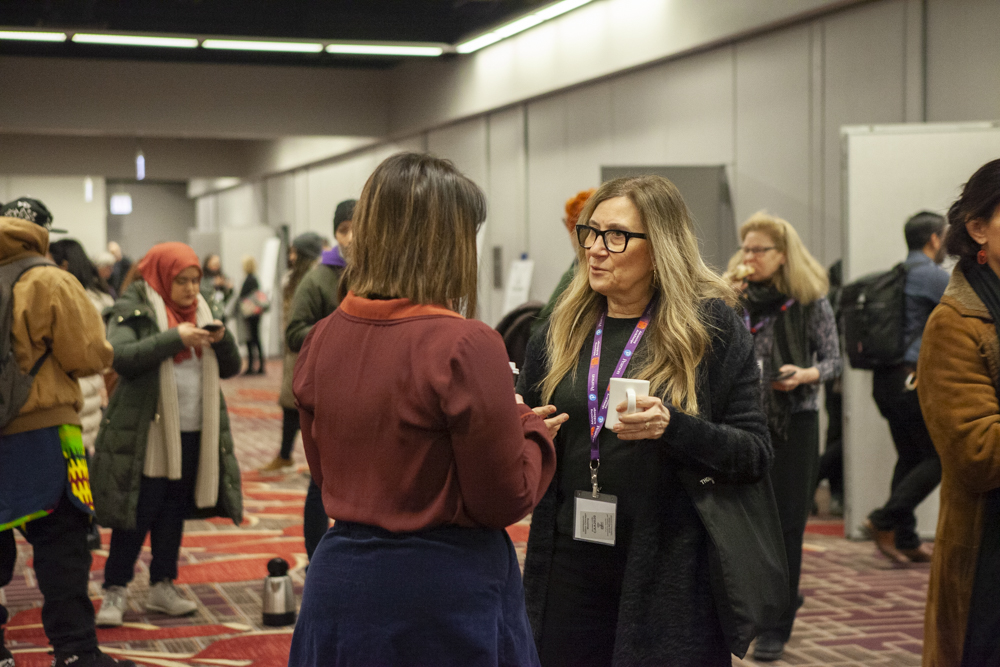
Attendees at the 2020 Annual Conference in Chicago. Photo: Stacey Rupolo
Each spring, members have the opportunity to provide crucial service to the field and gain an inside view by volunteering to work on a CAA committee or editorial board.
Any member may self-nominate for the following positions or (after ascertaining interest) nominate another member. For more information, please click on the links below.
CURRENT OPPORTUNITIES
Art Journal—Editor-In-Chief
Deadline (extended): June 1, 2020
caa.reviews—Field Editor for East Asian Art
Deadline (extended): June 1, 2020
Publications Committee—Two Members
Deadline (extended): June 1, 2020
PAST OPPORTUNITIES
Art Journal / Art Journal Open (AJO) Editorial Board—Three Members
Deadline: April 15, 2020
The Art Bulletin Editorial Board—One Member
Deadline: April 15, 2020
The Art Bulletin—One Reviews Editor or Coeditor Team
Deadline: April 15, 2020
caa.reviews Editorial Board—Three Members (One an Emerging Professional)
Deadline: April 15, 2020
caa.reviews—Eight Field Editors
African Art, African Diaspora/African American Art, Architecture and Urban Planning, Asian Art, Contemporary Art, Exhibitions: East Coast, Exhibitions: Midwest, Exhibitions: West Coast
Deadline: April 15, 2020
Sign Up for Mock Interviews at CAA 2020
posted by CAA — January 06, 2020
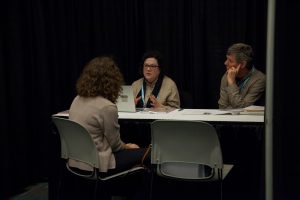
Interview booths at the 2018 Annual Conference in Los Angeles. Photo: Rafael Cardenas
Each year at CAA, the Students and Emerging Professionals Committee (SEPC) offers 30-minute mock interviews for those looking to develop and refine interviewing skills, including job-seekers. Participants practice one-on-one with a seasoned interviewer and receive candid feedback.
SEPC makes every effort to accommodate all applicants, however, space is limited. Interviews are available by appointment via the pre-conference Google Registration Form. Registration is Monday, January 6 to Friday, January 31. Participants will be notified of their slot by e-mail. With confirmation, we’ll request a CV and cover letter for your interviewer. On-site registration will be available at the conference, but pre-registering is strongly recommended for those whose conference plans are confirmed to get more tailored training and feedback.
Free of charge, CAA members only. Sign up via the pre-conference Google Registration Form.
Announcing Pay-as-You-Wish Day for CAA 2020
posted by CAA — December 13, 2019
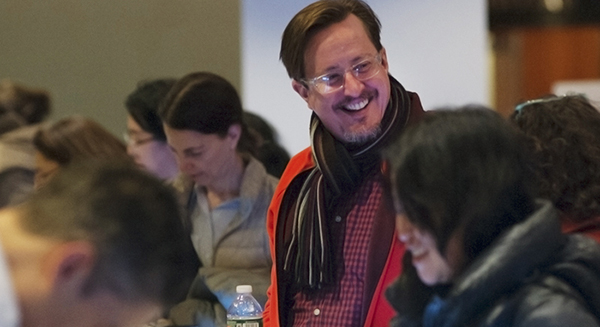
Attendees at the 2019 Annual Conference in New York. Photo: Ben Fractenberg
We’re looking forward to seeing everyone in Chicago, February 12-15, 2020 for the Annual Conference.
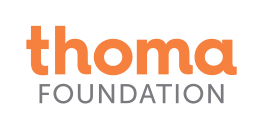
We are excited to announce that we will offer Pay-as-You-Wish for one day, Friday, February 14, thanks to generous support from the Carl & Marilynn Thoma Art Foundation.
On Wednesday, Thursday, and Saturday, we will offer a variety of onsite registration options including:
- Single-session timeslot ticket— $20
- Book & Trade Fair only pass— $20
- One Day Pass (includes sessions and Book & Trade Fair)— $100
- Full conference registration— prices vary depending on membership tier
In addition, we have extended Early Registration until 11:59 PM (EST), Wednesday, December 18! Take advantage of early registration, the lowest rates for the full conference, and don’t forget to grab a ticket for our Opening Reception, hosted by Columbia College Chicago.
Apply for a Childcare Grant for CAA 2020
posted by CAA — December 06, 2019
Thanks for your interest! As of January 2, 2020, childcare grants are at capacity and the application portal is closed.
CAA recognizes the need among members for childcare support during the Annual Conference. In our effort to better meet these needs, CAA now offers grants of up to $250 per family.
Grants are available for CAA members who are registered for the conference and will bring their child to the conference, or who will incur extra care-giving expenses while away from their dependents.
Deadline to apply: January 5, 2020
Grant funding is limited and grants will be filled on a first-come, first-served basis. (If you signed up for the now-canceled onsite care with Kiddie Corp, you will be given priority.) The grants will be given as a reimbursement for expenses up to $250 upon submission of receipts or invoices.
Examples of allowable expenses
- Childcare expenses incurred on-site at the conference.
- Daycare above and beyond what is normally scheduled because member is attending the conference (for example, overtime at a daycare center, cost of a sitter, etc.)
- Travel expenses incurred in bringing a caregiver/family member to supervise your child at the conference or at your home.
- Travel expenses incurred in bringing a child to a caregiver/family member.
Note: Care must occur during the conference dates. Attendees are responsible for making their own arrangements. CAA does not sanction or recommend childcare providers and does not assume responsibility or liability for childcare services of any sort. It is the responsibility of the parent(s) to thoroughly investigate all childcare providers.
Expenses not eligible for reimbursement
- Normally scheduled childcare expenses in your home city.
- Toys, and tickets to museums, amusement parks, etc.
- Travel or other expenses related to the attendee’s participation in the meeting, conference registration, meals, or other expenses the attendee would already be incurring by attending the meeting.
Reimbursement procedure
- Reimbursement forms will be distributed to grantees upon notification, the completed PDF must accompany a scan of receipts.
- Recipients of a grant must submit receipts for reimbursable expenses by email to Mira Friedlaender, mfriedlaender@collegeart.org with the subject line “Child Care Reimbursement”, by March 5, 2020
- Reimbursements will be distributed within 3-4 weeks of CAA’s receipt of complete documentation.
Grants will be awarded on a rolling basis. The deadline to apply for the grant is January 5, 2020.
Questions about childcare grants for the Annual Conference? Email mfriedlaender@collegeart.org
The following Chicago-based childcare services are available for attendees seeking childcare during conference. CAA has no contract with these service providers, and this list should not be considered an endorsement of any companies listed.
American Childcare
207 East Ohio Street, 121, Chicago, IL 60611
Phone: 312-644-7300
Website: http://www.americanchildcare.com/hotel_babysitting.htm
College Sitters
1000 West Diversey Parkway, 234, Chicago, IL 60614
Phone: 773-697-9326
E-mail: lincolnparkil@collegenannies.com
Website: http://www.collegenanniesandtutors.com/nechicagoil
Sitters Studio
Phone: 312-890-8194
E-mail: bookchicago@sittersstudio.com
Website: http://www.sittersstudio.com/hotel-care/
Apply to Join the CAA Council of Readers
posted by CAA — November 26, 2019
In preparation for the spring submission cycle for the 2021 Annual Conference in New York, the Annual Conference Committee will appoint up to 22 new members to the Council of Readers. Council members read and rate session and presentation proposals and serve a crucial role in the review process for the Annual Conference.
Over 950 proposals are submitted for review each year for selection to the conference program. Each proposal is read by three Council members. By providing their time, knowledge, and expertise of their fields, the council helps to shape the conference program. Each member of the Council reviews up to 60 proposals per year from across CAA’s fields of study and as much as possible from within their self-identified scholarly focus and knowledge. Most proposals include one 250-word abstract, while complete session submissions can include 4-5 abstracts (1250 words). Each reader receives a similar amount of content.
Requirements for Readers
- Current CAA membership
- Time commitment to read and review no more than 60 proposals online in May 2020
- Ability to participate as a Council of Readers member for up to three years
- Readers are required to read and abide by CAA’s Statement on Conflict of Interest and Confidentiality
- Abbreviated CV uploaded to online form
- Completed online form
Application deadline: January 14, 2020
More details:
- The Council of Readers is a group of 50 to 75 CAA members from Professional Committees, Affiliated Societies, and general membership overseen by the Annual Conference chair.
- Readers will be asked to review proposals from across CAA’s fields of study, and as much as possible from within their self-identified scholarly focus. Readers with broad areas of interest are encouraged to participate.
- The proposals will be distributed by May 11 and must be completed by June 8, 2020.
- Readers will access abstracts and complete their reviews in our online system, with orientation and support from the Annual Conference Committee and CAA staff members.
- Each proposal is read and reviewed in the online portal by three different Council members.
- The majority of proposals include a single 250-word abstract, while complete session submissions can include 4-5 abstracts (1250 words).
- Readers will review no more than 60 proposals each, with proportional share of abstracts.
- For each proposal, Readers will use a scale of 1-5 to answer five questions and also enter a short comment for the Annual Conference Committee’s review.
- Members of the Council of Readers serve a three-year term on a rotation so that each year, one third of the council is new.
- The Council of Readers does not meet together in person or electronically.
- After proposals are read and reviewed by the Council, the chair reports to the Annual Conference Committee on session topics, including identifying possible areas of content that are missing from the submissions received.
- The chair finalizes the conference content based on the reviewed submissions.
Pleas email Mira Friedlaender, Manager of Annual Conference, mfriedlaender@collegeart.org, or Tiffany Dugan, Director of Programs and Publications, tdugan@collegeart.org, with any questions.
Apply to be a Mentor or Mentee at CAA 2020
posted by CAA — November 25, 2019
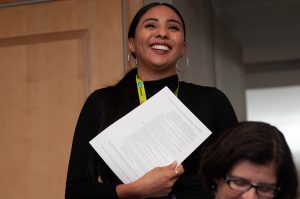
Attendee at the 2019 Annual Conference in New York. Photo: Ben Fractenberg
We invite you to participate in CAA’s mentorship program during the 108th Annual Conference, taking place February 12-15, 2020 in Chicago.
Mentoring appointments offer support for current CAA members at any stage of their career, regarding professional development and portfolio review. Applicants are paired in one-on-one meetings with an experienced professional from within the membership for individual twenty-minute consultations. Topics are open and may include: how to conduct a thorough job search; present cover letters, CVs, and digital images; and prepare for interviews. Whenever possible, CAA matches participants and mentors based on medium or discipline.
Conference registration, while encouraged, is not necessary to participate. Meetings are made by appointment only, in advance of the conference. Participants are chosen by a lottery and are notified of their scheduled date and time slot by email in early 2020. Limited slots may be available during the conference. Visit the CAA Information booth in Registration during the conference for more information.
As part of a pilot to expand CAA mentorship, CAA will support pairs that choose to continue their dialog for the following six months after meeting at the conference. Please consider if you might be able to commit to a minimum of three check-ins and to give feedback via online form at the end of September 2020.
To sign up for an appointment, complete this form:
To volunteer to mentor, please complete this form:
Call for Submissions: CAA 2020 MFA Screening
posted by CAA — November 20, 2019
CAA’s Services to Artists Committee (SAC) invites MFA students to submit video work for consideration for the upcoming CAA 108th Annual Conference in Chicago in February 2020.
Selected works will be premiered during the conference in the Media Lounge on Wednesday, February 12, 12:15–1:45 PM, and screened during the conference at the ARTexchange exhibition, which will be presented at the Hokin Gallery at Columbia College (623 South Wabash), a half block north of the conference hotel.
Through this screening and exhibition initiative, SAC aims to welcome the next generation of artists and practitioners into our midst. Our annual MFA Screening celebrates the hard work of MFA students across the nation and world, while exposing their artworks to a broad audience. We look forward to reviewing your submissions.
Please use the form here or the button below to submit your entry (a maximum of three per participant).
Deadline: December 10, 2019
Submission for consideration is free, and membership with CAA is not required (we are collecting that information for statistical purposes).
Jurors: Joan Giroux, Richard Serrano, and Vagner Mendonça-Whitehead
Submissions should include the following:
- A short bio (50 words or less)
- A short artist statement (100 words or less)
- A link to 1–3 videos
- Personal website (optional)
Specifics for your submissions:
- 5 minutes in maximum length (excerpts accepted)
- mpeg 4
- 720p
- Slate/Title cards: 5 seconds, with your name, title of work, date of completion, name of school/program
- uploaded onto Vimeo.com (upload your link, allow it to be download-able)
Deadline: December 10, 2019
Acknowledgment: January 15, 2020
In collaboration with the Committee on Women in the Arts, CAA offers 50 percent of the 2020 conference’s content in celebration of the Centennial of Women’s Suffrage in the United States, while also acknowledging the discriminatory practices that limited voting rights for Indigenous women and women of color, even after the passage of the 19th amendment in 1920. The Services to Artists Committee encourages applicants to embrace the spirit of the 2020 conference by engaging issues of inclusivity and intersectional discourses in the arts.
About us: The Services to Artists Committee (SAC) was formed by the CAA Board of Directors to seek broader participation by artists and designers in the organization and the Annual Conference. SAC identifies and addresses concerns facing artists and designers; creates and implements programs and events at the conference and beyond; explores ways to encourage greater participation and leadership in CAA; and identifies ways to establish closer ties with other arts professionals and institutions. To this end, committee members are responsible for the programming of ARTspace and its related events.
Deadline extended! Annual Conference Committee Seeks Members
posted by CAA — November 12, 2019
CAA invites nominations and self-nominations for two at-large members of the Annual Conference Committee to serve a three-year term. Terms begin February 2020, immediately following the 108th Annual Conference.
The Annual Conference Committee, working with the CAA Programs Department, selects the sessions and shapes the program of the Annual Conference. The committee ensures that the program reflects CAA’s goals for the conference, namely, to make it an effective place for intellectual, aesthetic, and professional learning and exchange; to reflect the diverse interests of the membership; and to provide opportunities for participation that are fair, equal, and balanced.
The Annual Conference Committee meets during the conference and at the call of the program chair and vice president for Annual Conference. Committee members also serve to support sessions comprised of individual papers and projects where a formal chair has not been identified.
Please send a 150-word letter of interest and a CV to Mira Friedlaender (mfriedlaender@collegeart.org), CAA manager of annual conference.
Deadline (extended): February 18, 2020
An Interview with Kellie Jones, 2020 CAA Distinguished Scholar
posted by CAA — October 28, 2019
We are delighted to welcome Dr. Kellie Jones, professor in Art History and Archaeology and the Institute for Research in African American Studies (IRAAS) at Columbia University, as the Distinguished Scholar for the 108th CAA Annual Conference in Chicago, February 12-15, 2020.
Dr. Jones, whose research interests include African American and African Diaspora artists, Latinx and Latin American Artists, and issues in contemporary art and museum theory, is the recipient of awards from the Hutchins Center for African and African American Research, Harvard University, Creative Capital, and Warhol Foundation, among others. In 2016, she was named a MacArthur Foundation Fellow. In 2018, Dr. Jones was the inaugural recipient of the Excellence in Diversity Award from CAA.
CAA media and content manager Joelle Te Paske spoke with Dr. Jones earlier this fall to learn about what she’s working on and looking forward to in upcoming exhibitions and scholarship. Read the interview below.
This interview has been edited for length and clarity.
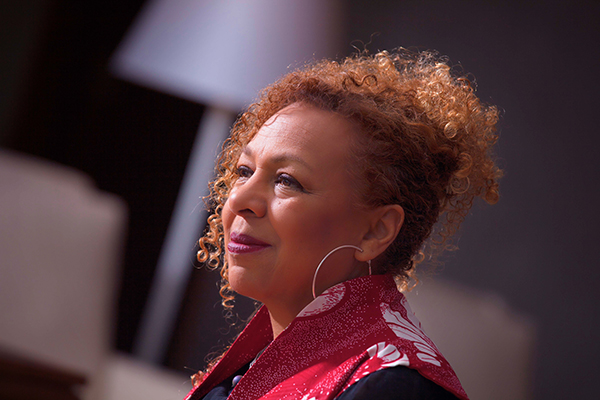
Dr. Kellie Jones. Photo: Rod McGaha
Hi, Professor Jones. Thank you for taking the time for this interview. It’s an honor to speak with you and we’re excited that you’ll be with us in Chicago.
I’m looking forward to it.
Great. So to begin—to locate ourselves in time and place—how are you? How was your summer?
It’s always fun, and it always ends too quickly. I think that’s just normal. [Laughs]
Yes, I guess that’s where we should be at this point [laughs]. Were you working on a particular project this summer?
Yes. I was working on a project for Center for Advanced Study in the Visual Arts (CASVA). Huey Copeland of Northwestern University and Steven Nelson of UCLA are spearheading a Black Modernisms seminar with a group of scholars. I just finished an essay on the Harlem Renaissance that is still to be titled. I haven’t written extensively on that period so I’m really looking forward to hearing back from them. It involves race and gender and I’m very excited about it.
What else is exciting in your work right now?
Candida Alvarez: Here, A Visual Reader (Green Lantern Press 2019), the first major monograph on the Chicago-based painter, is about to hit shops. I’m excited by this project to which I contributed the essay, “When Painting Stepped Out to Lunch.” I have book that I’m finishing on global conceptual art networks that is tentatively titled Art is an Excuse, on how conceptual art allowed for different types of global connections. One great example is Senga Nengudi and her relationship to Japan which is something I’ve written about earlier but I wanted to more forthrightly connect to Japanese conceptualism. So how does Senga Nengudi fit into that dialogue, or what is her dialogue? I’m thinking about conceptual art as a motor for global art connection, different from what people call globalization—more like artist dialogues, not neoliberal globalization.
A macro view.
The book is more about relationships. We always think about artists in their particular nationalist space. What did Japanese conceptualism look like? What did Latin American conceptualism look like? How were they different? But we really don’t talk about the kind of dialogue that people have with each other. That’s really the whole premise of the project.
That’s terrific. I read that for undergrad at Amherst College you made an interdisciplinary major. I was going to ask: Has an interdisciplinary outlook been formative in your career? But I feel you’re already embodying that.
You’re absolutely right. I created an interdisciplinary major at Amherst. Shout out to my alma mater and to liberal arts education.
We love that at CAA, yes.
And we love it because it allows people to see the breadth of the world in some fashion and then choose something or choose a few things. I’m one of the people that thought about Latin American and African American and Latinx artists at least from my college years, and I’ve been going with that for the longest, along with ideas of the African diaspora. You might start out with “Let’s compare”—the comparative structure; the binary is such a signature of art history. But then you realize that it’s so much more than a just a binary—the interdisciplinarity, the multidisciplinarity. That’s always been a part of what I’ve looked at because at that time—and I know I’ve said it on numerous occasions in numerous platforms—art history was really taught one way. Because I had grown up in New York I said, “But wait a minute, they’re leaving out all of these people that are making art that I know!” That I see every week. I mean, how is that possible? So I started there and just kept going.
I also read that you wanted to be a diplomat originally, and that makes sense to me. I think art historians are often part-diplomats, part-detectives, part-scientists. There’s so much that goes into the field.
Absolutely. I wanted to get away from art. I grew up with artists and poets and I said, “Oh my god, these people are broke. I can’t do that.”
Well, that’s realistic—I suppose it’s changed, too.
It’s absolutely changed, but if you’re thinking about late 1970s—wow. People weren’t even thinking about objects too much.
Someone reminded me much later—maybe a couple of years ago—they said, “Well you know, you’ve been doing [diplomacy] with art. You’ve been a cultural ambassador with this work, because you’ve done shows around the world.” Art history became, “Wow, you can do the same things.” You can study languages. You can travel. It did become a way you could do all those things, and then of course as you just mentioned, as a curator you are a diplomatic entity between artists and the institution.
As a liaison, definitely. It’s sensitive.
Right. Even as an academic, if you’re traveling around or if you’re representing a contemporary artist in your writing—how do you balance how the artist sees themselves with what you have to say? There’s always that.
I’m curious what you see as emerging trends in scholarship, especially in art history.
I think students and academics—particularly a new generation—don’t want traditional art history as we have known it. They want a more interdisciplinary, multidisciplinary, global understanding of art in the world. Art history is not just Europe, and it’s not just the United States. And the art of the United States meaning not just New York!
I think the other really exciting arena is, of course, gender. Gender studies. Queer studies in art history. Trans studies. All those things really change how we understand the object, how we understand history, the histories that we look for. There’s a similarity to the discoveries that I made when I was a student in college about how art history at that time did not represent even the histories of African Americans who were in New York, for instance. United States art history is written from a New York-centric perspective. And at that time, you didn’t see too many women in it. You didn’t see too many African Americans or Latinx figures. So now that such subjects are more widely known the next step seems to be to ask,”What is a queer art history?” And some people have been doing this for a while: Jonathan Weinberg, James Smalls, Julia Bryan-Wilson has brought us into the present with some of these ideas, and C. Ondine Chavoya with his Axis Mundo, project. So all these ideas are becoming more visible and I think it’s really exciting.
That’s one of the reasons why I’ve been so keen on my Harlem Renaissance article. It started out in one way, and then it took me in another direction; it takes another look at objects that have been dismissed as not being relevant, and sees them through a different lens. It opens up other paths into these works that have been discarded. Or maybe not discarded, but put to the side. Let’s ask, “What’s going on with gender in these works?” What’s going on with queerness, and how do they signify to a Harlem Renaissance that is quite queer? It’s something people in literature have discovered, certainly in the African American context, and they’ve been talking about that for years. Art history has to catch up.
Yes, you feel a real energy in the field, a real hunger for it. With recent protests around Warren Kanders at the Whitney Museum, what are your views on that momentum? [Editor’s note: Since this conversation took place, Warren Kanders announced his resignation from the Whitney Museum board.]
Well, you know, there have always been protests at US museums as well as those around the world. So whether you are a curator or a director who bares the brunt of the protest, or you are an artist who withdraws, you’re part of history. Scholars down the road are going to say, “These people pulled out. These people wrote a letter. These were the curators. These were the board members.” So for me it’s just part of history, and it has ebbs and flows. There are a lot of things going on in this world that artists are addressing, that artists see. They do respond to the world in one way or another. You may not see it visibly, but it’s there.
I agree. I think putting new ideas in the world the way artists do is cultural change, and like you said—it’s interconnected. You can’t really have one without the other.
Yes. It’s part of a larger history.
When did you first join CAA? Do you have a favorite memory from a conference?
I had joined CAA by 1990, when I served as the co-chair of the programming at the Annual Meeting for the Studio or Artists’ sessions with Robert Storr. I’ve been on plenty of panels since then, but to be honored in this way is humbling and exciting. Even better, all of the respondents I asked to participate on the Distinguished Scholar panel said, “Yes! I’ll be a part of it.” So I’m thrilled about that. I’ve been at Columbia University about 13 years, and I remember when Rosalind Krauss was honored, and I participated in Richard J. Powell’s Distinguished Scholar panel. So to step into those shoes, it seems a bit surreal.
Thinking of Chicago in 2020—do you have a favorite art-related excursion there?
Well, the South Side Community Art Center is legendary. It’s one of the original community art centers from the New Deal era, and it’s still in existence. I would definitely say go to that. That’s my favorite.
I’m marking it down for myself. Are there exhibitions coming up this fall that you recommend?
Senga Nengudi at Lenbachhaus in Munich; Robert Colescott at the Contemporary Art Center in Cincinnati curated by Lowery Sims and Matthew Weseley; Lynette Yiadom-Boakye at Yale Center for British Art curated by Hilton Als; Hank Willis Thomas: All Things Being Equal…, his first major survey at the Portland Art Museum. Curator Meg Onli at ICA Philadelphia has done a trio of shows under the title Colored People Time. The final component Banal Presents will be on view through December 22, 2019.
Shows that are further out that I’m excited about are Prospect 5 in New Orleans (Fall 2020), curated by Naima Keith and Diana Nawi. The citywide triennial in New Orleans is just a great experience. Everyone should check it out. Thomas Lax’s exhibition on Just Above Midtown gallery, that generative space of 1970s and 1980s, and its founder Linda Goode Bryant, will be wonderful to see at MoMA in 2022.
There are so many great young curators out here. Rujeko Hockley, Erin Christovale, numerous others. Tiona Nekkia McClodden is an artist who’s been doing some great archival curatorial work. She had a show that was in response to the anniversary of Mapplethorpe’s The Perfect Moment that just closed. There are just so many great people out here doing some wonderful things, and a lot of wonderful younger artists. I’m excited by it. We started out by talking about multidisciplinarity, interdisciplinarity—young curators are invested in that idea as much as scholars.
Oh and one thing that I’m really looking forward to down the line is, of course, the reopening of the Studio Museum in Harlem. I cannot wait for that!
Yes! It’s a ways off but that’s an exciting one. Well, thank you Dr. Jones. I appreciate you taking the time, and it’s been a pleasure to speak with you.
Thanks for your questions, and again it’s really an honor to be a part of this whole thing. I still kind of can’t believe it. I guess I will in February when I step off that plane!
The Distinguished Scholar Session honoring Kellie Jones will take place Thursday, February 13, 2020, from 4-5:30 PM at the Hilton Chicago, Grand Ballroom.
Biography of Dr. Kellie Jones
Dr. Kellie Jones is a Professor in Art History and Archaeology and African American and African Diaspora Studies at Columbia University. Her research interests include African American and African Diaspora artists, Latinx and Latin American Artists, and issues in contemporary art and museum theory.
Dr. Jones, a member of the American Academy of Arts and Sciences, has also received awards for her work from the Hutchins Center for African and African American Research, Harvard University and Creative Capital | Warhol Foundation. In 2016 she was named a MacArthur Foundation Fellow.
Dr. Jones’s writings have appeared in a multitude of exhibition catalogues and journals. She is the author of two books published by Duke University Press, EyeMinded: Living and Writing Contemporary Art (2011), and South of Pico: African American Artists in Los Angeles in the 1960s and 1970s (2017), which received the Walter & Lillian Lowenfels Criticism Award from the American Book Award in 2018 and was named a Best Art Book of 2017 in The New York Times and a Best Book of 2017 in Artforum.
Dr. Jones has also worked as a curator for over three decades and has numerous major national and international exhibitions to her credit. Her exhibition “Now Dig This! Art and Black Los Angeles, 1960-1980,” at the Hammer Museum, Los Angeles, was named one of the best exhibitions of 2011 and 2012 by Artforum, and best thematic show nationally by the International Association of Art Critics (AICA). She was co-curator of “Witness: Art and Civil Rights in the 1960s” (Brooklyn Museum), named one the best exhibitions of 2014 by Artforum.



